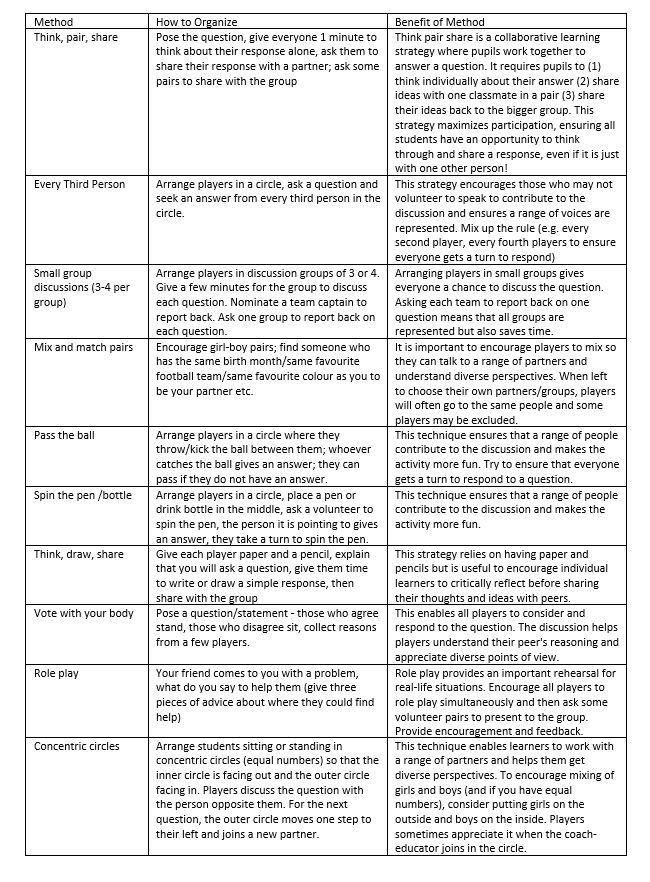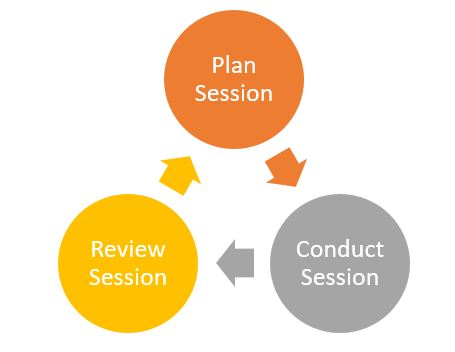The following participatory methods are used throughout in the Football for Schools App.
Using participatory methods

Working in mixed or single sex groups
In some settings it will be more appropriate to facilitate the sessions to single sex groups. In others it will be better to provide for mixed sex groups. If running mixed sex groups, there may be occasions when it is preferable to split the sexes for certain activities such as for games involving significant physical contact or a discussion of more sensitive life skills topics.
Plan, conduct and review sessions

The coach-educator should consider the following when planning a session.
- How do you coach children football at school?
- Who are the children participating and how old are they?
- Is there a mix of boys and girls?
- What can be taught in the training session and why?
- How do they learn these skills in the training session?
- What is your role and function as a coach-educator during the training session?
The coach-educator should ensure that everything in practice should resemble the real game as much as possible. Exercises and drills serve a purpose, but most practice should be spent playing the game. If in doubt, ask yourself the following question: “Are the children and young people playing football, are they learning life skills and are they having fun?”
Your plan needs to consider the intended learning outcomes for the session, both football and life skills, facilities (e.g. a field) and equipment, the number of players, their ability and what they have learnt so far in other sessions.
A recommended time allocation is provided with each component of the session. This is an estimate only. Some groups will take a little shorter and some a little longer. Use your judgement to manage the pace and keep an eye on the time throughout the session. It is important to plan and manage the session within the time you have available. This may mean spreading the session between two time slots. This programme has been designed to develop both sports and important life skills. Therefore, we strongly encourage coach-educators to ensure they make time for the opening and closing circles.
The coach-educator needs to be at the field BEFORE the players to ensure everything is ready.
The coach-educator should consider the following as they conduct each training session:
- Do you stand/situate yourself in a suitable place for training?
- Do you monitor the performance and conduct of the players?
- Are the players able to implement the football activity? Is it too easy or too difficult?
- Have you developed the exercises and drills properly for the game?
- Did the training session have the desired result(s)?
- Did the training session fulfil your expectations – and those of the players?
The following recommendations are helpful to guide each training session:
- Space: Create an effective learning environment. Keep the organization of the space simple. The initial set up, with small changes, should be maintained throughout the whole session. Resetting cones during a session can easily disturb the flow of training.
- Time: Time is flexible. Let the practice flow and make the coaching points at the right time, using breaks to give feedback to the group.
- Intensity: Use short periods of time at high-intensity and utilize resting periods to explain the practices or make coaching points.
- Rules: Use different rules to adapt the practices to the characteristics of the players and make the exercises age appropriate.
- Number of players: Practice should progress from smaller to bigger groups of players. Use support players to create superiority in numbers and to make the exercises easier for the attackers.
Further information on how to modify sessions to suit the needs of players of all abilities and to ensure every child and young person has an equal opportunity to take part in Football for Skills sessions can be found in the Inclusive Football page of this website.
Coach-educators should take care to avoid the following circumstances that can be detrimental to the learning process:
- Excessive coaching and interference during training activities and games.
- Incorrect and inappropriate exercises that fall short of the aim of the training session.
- Training sessions that do not flow and are frustrating, i.e., too difficult or boring, not suitable for ability or age.
- Game and activities that do not resemble football may be unattractive to the players.
The coach-educator should consider the following as they review how the session went.:
- Have a discussion with the players – allow them to provide feedback on the session activities. In addition, the coach must not underestimate the value and impact of a positive comment or individual feedback to a player after the training session.
- Review the session plan and note what worked well and what needs to improve.
- Evaluate yourself - do not be ashamed to ask for constructive feedback and the opinion of your colleagues in relation to your coaching/teaching management and structure of the session.